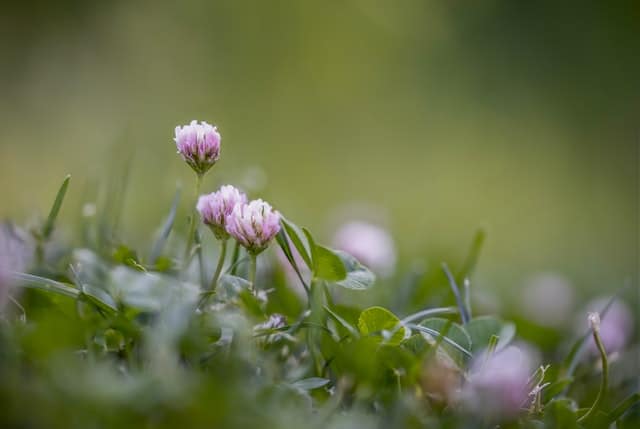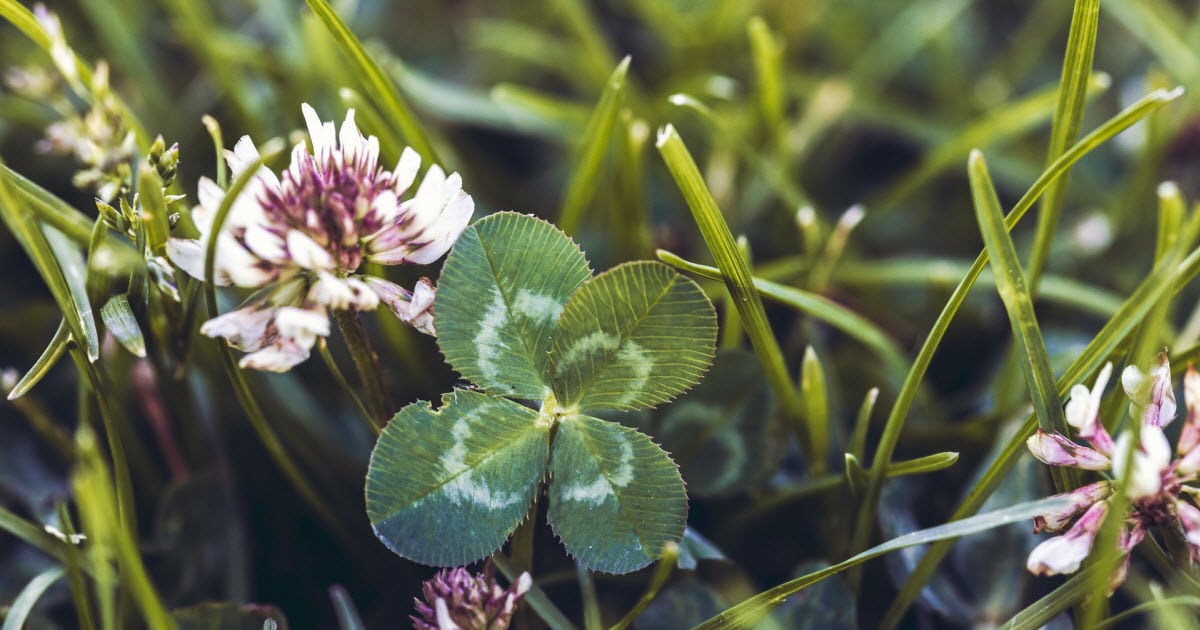The belief that clover will take over your lawn if you leave it untreated is a common misconception. The truth is that clover won’t typically crowd out grass, and in fact it can offer certain benefits as part of a well-maintained lawn. Clover adds Nitrogen to the soil, and effectively creates its own fertilizer, meaning that it can help your lawn stay healthier. In today’s article I’ll answer the question “Will Clover Take Over Grass?” and I’ll explain some of the drawbacks and benefits of having clover in your lawn.
You may be interested to learn why people started wanting to get clover out of their lawns to begin with.

This article was last updated on by Lawn Chick Owner Sarah Jameson
Article content reviewed for accuracy by Certified Horticulturist Nicole Forsyth, M.S.
I have an article about the history of lawns elsewhere on this site, and in that article one of my favorite pieces of information is that clover was not considered a weed until one of the herbicides developed to kill lawn weeds killed clover too.
Until that happened, nobody was worried about clover in their lawns, but when a weed killer killed clover, the manufacturers put it on the label, and homeowners started assuming that clover was bad for lawns and that it needed to be removed.

Now some people just don’t like the look of clover in their lawns, and I understand that.
If you’re trying to achieve a flawless green carpet-like lawn you’ll want 100% turfgrass.
But before you sweat the small stuff (clover), let’s talk some of its benefits.
| LawnChick.com is reader supported. If you make a purchase after clicking a link, I may earn a commission at no additional cost to you. |
Benefits of Growing Clover in Lawns
As you have probably heard, scientists are worried about how bee populations are faring around the world. And without enough bees, the world’s food supply would be in great peril.
Clover helps the bee population, as it’s a wonderful nectar source.

Just a few examples of vegetables that are pollinated by bees, butterflies, and other insects include beets, broccoli, asparagus, green peppers, tomatoes, squash, onions, lettuce, cucumbers, and celery.
A selection of the vast array of fruits that bees pollinate include apricots, cherries, figs, most citrus, kiwi, mango, papayas, strawberries, raspberries, peaches, avocado, and of course apples.
Look, we all want to have perfect lawns … but it’s important to look out for the little guys that keep us fed, right?

Other Reasons to Make Peace with Clover
You may not have noticed if you only have a small patch in your lawn, but clover is a wonderfully smelling plant. There’s a reason pollinators always seem to find it – the little blossoms have an incredible aroma.
Many people (myself included – but I’m Irish so I may be biased) think clover looks rather pretty.
It can also be good to have clover in your lawn if you prefer to keep your lawn short. That’s because clover tends to prevent other types of weeds from taking hold in your lawn.
When you see lawns with a lot of clover, you will probably notice there weren’t many dandelions.
Clover also works symbiotically with beneficial bacteria.
These good bacteria attach to clover roots. This helps your lawn absorb nitrogen found in the environment, and of course if you’ve read any of my articles about lawn fertilizer then you know that nitrogen is what helps with green growth in lawns (Iron helps as well).
Why is There a Lot of Clover in Your Lawn?
Clover tends to proliferate most on lawns with depleted or otherwise inappropriately maintained soil.
This is because clover is able to create its own fertilizer, something I’ll get into later in this article.
Other things that can cause your soil to be over-stressed and therefore more likely to grow clover include over-fertilization and excessive irrigation (and frequent heavy rainfall).

Water is great for lawns, but too much of a good thing can wash away the nutrients your lawn depends on.
Homeowners who decide that they want to have more clover in their lawn are able to plant it.
Examples of people who might do this are those who want to attract more bees onto their property, or those who want to naturally feed and support the soil so they don’t have to fertilize their lawn as often.
F(orget) the Bees … I Just Want the Clover Gone!
A lot of people who wonder will clover take over grass in my lawn? aren’t worked up about pollinators.
Others may have allergies in their household and don’t want as many bees working on their property.
Or maybe you just don’t like the way clover looks.
There are steps that you can take to get rid of clover.
It’s a Perennial, Just Like Your Grass
Be aware that clover is a perennial. That is why you will need to take steps to get rid of it every year until your lawn is clover-free.
We all know that lawn maintenance is a constant process, and you will have to stay on top of keeping your lawn in tip-top shape.
Making sure that your lawn is well-fertilized and watered will help your grass outperform any clover that’s present.
Step Away from the Herbicides
It may seem contrary to what you’d think, but in fact, one of the most effective steps you can take towards making clover less likely to proliferate in your lawn is to fertilize your lawn properly.
Clover tends to grow especially well in yards that aren’t adequately fertilized.

I recommend a good, slow-release organic lawn fertilizer.
I use Milorganite 4 times annually on my lawn with great results.
If you don’t want to spend that much on fertilizer, at the very least you should fertilize your lawn properly in the fall and spring each and every year.
Why I Go Organic (and you should too)
I feel that it’s best to use an organic fertilizer that is rich in nitrogen, and I prefer organic products for a couple of reasons.
The primary difference between organic and synthetic fertilizers is that man-made fertilizers feed the grass, and organic fertilizers feed the soil.
If you have clover, you have a soil problem … so feed the soil with a good organic fertilizer.
People who rely on synthetic fertilizers create lawns that depend upon those man-made products to thrive. When their grasses don’t get enough of what they need clover is ready to pick up the slack.
It’s not a philosophical issue for me, it’s a practical one. Supporting soil health creates a more resilient lawn over the long term.
Your Options
There are several different kinds of organic fertilizer, and in fact I have an entire article about choosing the best organic fertilizer for your lawn.
But to summarize, these include:
- Plant-based fertilizers,
- Animal-based fertilizers, and
- Mineral-based fertilizers.

Animal-based fertilizers are made from materials such as poultry manure, cow manure, bone meal, fish emulsion, shellfish meal, earthworm castings, and blood meal.
Milorganite probably falls into this category, because it’s made from the manure of the fine residents of Milwaukee, Wisconsin.
Plant-based fertilizers are made from materials such as grass clippings, seaweed, kelp, alfalfa meal, corn gluten, cottonseed meal, soybean meal, and corn gluten meal.
Mineral-based fertilizers use materials such as Epsom salt, greensand, and rock phosphorus.
Mow it High
If you don’t want clover on your lawn, you should also put your mower on a higher setting.
Clover prefers when grass is cut shorter.

And be aware that the pH of your lawn may be making it easier for clover to grow.
The best pH for lawn soil is approximately 6.5. This means that it is slightly acidic. Soil that is overly acidic can mean that grasses and plants that are more delicate. They may have difficulty growing and thriving.
I own this cheap pH meter from Amazon and it works great.
Clover is able to deal with a very acidic soil. To adjust the pH of your soil, you can apply some minerals (such as lime).
Here’s an article that will help you decide if you need to apply lime to your lawn.
And this one will help you not apply too much lime.
Once you’ve set these conditions on your lawn, you can apply an organic weed killer if you still feel you have too much clover.
Ensure that your lawn is well-watered and that you do a deep watering (watering to about an inch of depth) before application of the organic weed killer.
Pull It
If you only have small patches of clover in your yard, you can try just pulling it out by hand.

This is time-consuming and labor-intensive process. It’s the sort of thing that makes a great punishment for kids in my house.
It’s not practical if you have large areas of clover that you need to deal with.
When pulling out the clover, it’s vital that you pull it out all the way from the roots. Of course, this is the case with any kind of weed.
Will clover take over grass? Probably not.
And if you ask me, having a little clover in your lawn isn’t anything to worry about.

My advice? Instead of addressing the symptom (clover), address the problem (depleted soil).
Work on improving your yard from the ground up with organic fertilizers, lime, and good compost.










